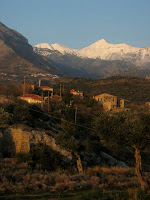Mount Profitis Ilias
There are hundreds of mountains named after the prophet Elijah in Greece (he ascended into heaven from the top of one), but this must surely be the highest. At 2,404m it is also the biggest mountain in the Peloponnese and can be capped with snow from November to May. Given this it is actually not that hard to reach the summit, most easily from a mountain refuge above Sparta. On the 20 July, Elijah’s name day, this lonely height attracts quite a crowd.
Polilimnio
The ‘many lakes’ that make up Polilimnio come as quite a surprise in a land where most rivers run dry during the summer. They are a series of pools formed by the river Kalorema (‘Beautiful Stream’) as it runs through a gorge. If you can find them, and are prepared to do a bit of walking, they provide an idyllic spot for a cooling dip and a picnic.
Viros Gorge
Stretching up above the village of Kardamyli on the Mani coast this spectacular gorge provides some tough, but rewarding, hiking. Those bold enough to attempt it will be surprised to find hidden monasteries in its depths, once well populated by monks.
Mesa Mani
The ‘Deep’ Mani is a barren, rocky, mountainous spit of land, that would normally offer little of attraction. For some reason, however, it exerts a sublime and magnetic force on the traveller. The fact that this was once the entrance to the kingdom of Hades, Lord of the Underworld, comes as little surprise.
Stymfalian Lake
Hidden up in the mountains this ‘lake’ rarely has water in it these days. Instead a sea of reeds covers the flat plain, catching the light as they sway in the breeze, and the surrounding peaks hover in the clouds above. A ruined Frankish abbey completes a Gothic picture that most would never associate with Greece. They should do more exploring . . .




